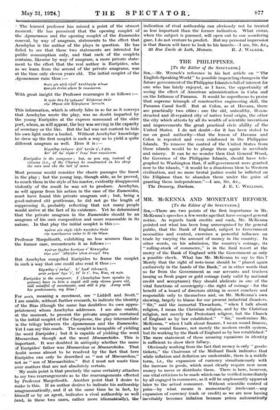MR. McKENNA AND MONETARY REFORM.
[To the Editor of the SPECTATOR.] Sm,—There are two points of the first importance in Mr. McKenna's speeches a few weeks ago that have escaped general notice. As regards bank credits and cash, Mr. McKenna pointed out what has been long unrecognised by the general public, that the Bank of England, subject to Government necessities and control, exercises a powerful influence on trade by varying the amount of money in the country. In other words, on his admission, the country's coinage, its "rolling-stock of commerce," is in the final resort at the mercy of the Bank of England with the Government as only a possible check. What has Mr. McKenna to say to this ? Merely that the right of note-issue should be "placed again exclusively in the hands of the Bank," or in other words that so far from the Government as our servants and trustees issuing us fresh paper or gold coinage (only valid by national credit and acceptance) they should abdicate in one of the vital functions of sovereignty—the right of coinage—for the benefit of a board of directors sitting in secret conclave and responsible only to themselves and, on Mr. McKenna's own showing, largely to blame for our present industrial disasters. "Sir," said the immortal Thwacktun, "when I talk about religion, I mean the Christian religion, and by the Christian religion, not merely the Protestant religion, but the Church of England as by law established." "Sir," modernizes Mr. McKenna, "when I talk about finance, I mean sound finance, and by sound finance, not merely the modern credit system, but its working by the Bank of England as by law established." The mere statement of these amazing equations in identity is sufficient to show their fallacy.
Obviously working from the fact that money is only "goods-
tickets," the Chairman of the Midland Bank indicates that while inflation and deflation are undesirable, there is a middle term, i.e., the expansion of currency simultaneously with the increase in goods, which must clearly require now more money to move or distribute them. There-is here, however, one vital criticism to be made which can be verified immediately by all engaged in commerce, as it will be unpleasantly apparent later to the actual consumer. Without scientific control °I price—by what means is momentarily irrelevant—any expansion of currency (cash or credit) as we are now having inevitably becomes inflation because prices automatically go up as they are now doing daily. Though the boom and the slump resulting will be each "only a little one," we shall still be a great way off from the one function and ideal of an economic system—" to deliver the goods" with sufficiency and success for the nation, rather than make money for the few and misery for the many. The key to it all is in finaure, as all right-thinking men are now beginning to realize and admit. But what is the technique of its control ?—I am, Sir, W. H. WAR1NSHAW. 1 Hutton Terrace, Newcastle-on-Tyne.











































 Previous page
Previous page